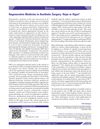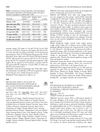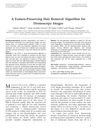Search
for
Sort by
Research
600-630 / 1000+ results
research Faculty Opinions Recommendation of Low-Level Light Therapy for Androgenetic Alopecia: A 24-Week, Randomized, Double-Blind, Sham Device-Controlled Multicenter Trial
Low-level light therapy significantly increased hair density and thickness in people with hair loss, but they didn't notice a difference.
research Faculty Opinions Recommendation of Efficacy and Safety of a Low-Level Laser Device in the Treatment of Male and Female Pattern Hair Loss: A Multicenter, Randomized, Sham Device-Controlled, Double-Blind Study

research Faculty Opinions Recommendation of Wnt-Dependent De Novo Hair Follicle Regeneration in Adult Mouse Skin After Wounding
Hair can regrow in adult mice's skin after injury, and this regrowth doesn't come from existing hair cells but from skin cells in the wound, with Wnt7a protein helping this process. This could help treat baldness and scarring.

research Faculty Opinions Recommendation of Wnt-Dependent De Novo Hair Follicle Regeneration in Adult Mouse Skin After Wounding
Hair can regrow in adult mice's skin after injury, and this regrowth doesn't come from existing hair cells but from skin cells in the wound, with Wnt7a protein helping this process. This could help treat baldness and scarring.

research Bioengineering a 3D Integumentary Organ System from iPS Cells Using an In Vivo Transplantation Model
Researchers created a fully functional, bioengineered skin system with hair from stem cells that successfully integrated when transplanted into mice.

research Exogenous Testosterone, Finasteride, and Castration Effects on Testosterone, Insulin, Zinc, and Chromium in Adult Male Rats
Testosterone and finasteride raise insulin and zinc, lower chromium in male rats.

research Cyclosporine A Stimulated Hair Growth from Mouse Vibrissae Follicles in an Organ Culture Model
Cyclosporine A was found to increase hair growth in mouse whisker follicles.

research Decreased Serum Ferritin and Alopecia in Women
Low serum ferritin levels are linked to hair loss in women.

research Simulation of Scalp Cooling by External Devices for Prevention of Chemotherapy-Induced Alopecia
Scalp cooling devices need to be powerful enough to overcome heat loss and reach the right temperature to prevent hair loss from chemotherapy.

research Cutaneous Adverse Drug Reactions to Antibiotics: Extent of the Problem
Antibiotics often cause skin reactions, making them a major health concern.

research Analysis of Animal Models of Alopecia Areata Based on Clinical Features of Traditional Chinese and Western Medicine
Better models and evaluation methods for alopecia areata are needed.

research Recent Advances in Electrospun Nanofibers for Wound Healing
New nanofiber technology improves wound healing by supporting cell growth and delivering treatments directly to the wound.

research Nutritional Factors and Hair Loss
Low iron and L-lysine levels can cause hair loss in women, and increasing these nutrients can reduce hair shedding.

research Balding Hair Follicle Dermal Papilla Cells Contain Higher Levels of Androgen Receptors Than Those From Non-Balding Scalp
Cells from balding scalps have more androgen receptors than cells from non-balding scalps.

research The Importance of Adequate Serum Ferritin Levels During Oral Cyproterone Acetate and Ethinyl Estradiol Treatment of Diffuse Androgen-Dependent Alopecia in Women
Having enough iron improves the effectiveness of a specific hair loss treatment in women.

research Modulation of Glucocorticoid Action and the Treatment of Type-2 Diabetes
Targeting glucocorticoid action might help treat type-2 diabetes, but human trials are needed.

research Dihydrotestosterone Induces p27 Degradation via Direct Binding with SKP2 in Ovarian and Breast Cancer
Dihydrotestosterone causes p27 protein breakdown in ovarian and breast cancer cells by binding with SKP2.

research Gender Differences in Scalp Hair Growth Rates Are Maintained but Reduced in Pattern Hair Loss Compared to Controls
Women's hair grows faster and thicker than men's, but hair growth slows for both genders with pattern hair loss.

research Analysis of the Scalp of Women with AIDS Subjected to Autopsy: Epithelial, Follicular, and Immunologic Aspects
AIDS may cause changes in the scalp that increase infection risk and hair loss.

research Regenerative Medicine in Aesthetic Surgery: Hope or Hype?
Regenerative medicine shows promise for aesthetic surgery, but needs more research for widespread use.

research George Ernest Rogers 1927–2021
George Ernest Rogers was a notable scientist who made important discoveries about hair and wool proteins.

research Protective Effect of DA-9401 in Finasteride-Induced Apoptosis in Rat Testis: Inositol Requiring Kinase 1 and c-Jun N-Terminal Kinase Pathway
Finasteride helps female-pattern hair loss.

research Androgens and Human Hair Growth
Androgens can cause hair growth in some areas and hair loss on the scalp.

research Clinical and Endocrine Characteristics of the Main Polycystic Ovary Syndrome Phenotypes
Different types of polycystic ovary syndrome (PCOS) have varying severity, with Type I being the most severe and common.

research Ancient-Modern Concordance in Ayurvedic Plants: Some Examples
Modern science supports the use of some Ayurvedic plants for health, as ancient practices suggested.

research Nanoparticle Systems Reduce Systemic Toxicity in Cancer Treatment
Nanoparticle systems make cancer treatment less toxic.

research Alopecia Areata: An Evidence-Based Treatment Update
Some treatments, like corticosteroids and sensitizing agents, can help with alopecia areata, but more high-quality research is needed.

research Targeting the Pre-Receptor Metabolism of Cortisol as a Novel Therapy in Obesity and Diabetes
Blocking a specific enzyme might help treat obesity and diabetes, but more research is needed to ensure it's safe.

research A Feature-Preserving Hair Removal Algorithm for Dermoscopy Images
The algorithm effectively removes hair from skin images, improving melanoma diagnosis accuracy.